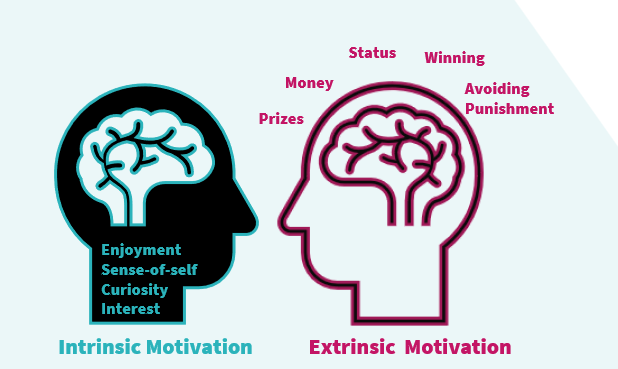Human-in-the-loop? Sure. But all too often businesses are implementing this with a disregard for the human part of it.
We’ve all seen the hyped-up narrative: AI is coming for your job 😱. But the reality is AI is more likely to reshape roles than replace them entirely – automating tasks, not people. This AI collaboration means that the way AI is implemented is crucial in ensuring employee’s wellbeing, motivation, performance and sense of belonging in an organisation.
With a background in neuroscience, I’ve always been fascinated by how our experiences shape our brain chemistry, behaviours, and emotions — and vice versa. Lately, I’ve been thinking about how AI might be influencing our neural motivation (specifically Intrinsic Motivation) and reward systems. And I think it’s something many organisations are wrongly overlooking.
If the research I’ve been reading is right, poor implementation of AI could be doing more than just frustrating employees — it could be actively undermining their motivation and ultimately ability to perform well at work.
Intrinsic Motivation – what is it?
Intrinsic Motivation is the drive to do something because we find it inherently enjoyable rather than being impacted from external consequences (reward or avoidance of punishment). It’s the kind of things we enjoy just because, for example:
-
Playing a sport because you find it fun
-
Taking on a challenge at work because you enjoy problem-solving
-
Contributing to Open-Source code for free because you just love writing code
Doing things like this, which we are intrinsically motivated to do, releases that lovely dopamine, without the need for external validation.
On the flip side, extrinsic motivation is the drive to do something to gain external reward or avoid punishment. Things like:
-
Playing a sport because there’s a prize up for grabs
-
Taking on something at work to achieve a bonus or avoid a difficult conversation with your boss
-
Coding because it pays the bills
Both types of motivation have their place — but when it comes to long-term engagement and wellbeing, intrinsic motivation is the real hero.

Why should businesses care?
Because intrinsic motivation isn’t just a “nice to have” — it’s a predictor of psychological well-being, productivity, performance, and learning.
Lower intrinsic motivation has been linked to higher rates of depression, while higher levels are associated with greater effort and better outcomes. So yes, offering external motivators like career progression, praise, and fair compensation still matters — but getting the balance right between intrinsic and extrinsic motivation is key to building happy, high-performing teams.
AI’s influence on intrinsic motivation
Yes, AI can boost efficiency and short-term performance. But it’s also been shown to reduce intrinsic motivation. A recent study of over 3,500 participants found that while AI helped people complete tasks more effectively, it also decreased long-term motivation and psychological wellbeing).
In the software space, there’s a concern that AI may take over the parts of the job people tend to be more intrinsically motivated to do and leave them with the less exciting task of reviewing AI-generated code. (And let’s be honest, how many developers do you know who get excited about code reviews?).
In the game development sector, developers have reported losing motivation as a result of being requested to use AI for the creative parts of their work.
Sense of control positively influences on intrinsic motivation. When working with AI, people’s sense of control may be reduced if they feel the AI is overriding or strongly influencing their own decision-making process. Perceived control over a task significantly enhances the brain’s reward response. If AI is seen as imposing decisions or removing agency, it can blunt the reward experience, even if the outcome is beneficial .
Aside from Motivation: The Self-concept Problem
Self-concept is the image we have of ourselves and an understanding of who we are. It is shaped by the roles we play and the skills we bring to the table in both a social and professional setting, e.g.:
-
‘I am an expert developer’
-
‘I am a skilled writer’
-
‘I am a strong communicator’
Delegating skills that form part of our identity to AI can challenge our self-concept and create cognitive dissonance. If a skillset or expertise you are proud of is being delegated to a machine, it can leave you questioning your own value and relevance.
This problem impacts the software development industry more than most, with research into AI pair programming showing that while it can improve code quality, it also risks reducing autonomy and motivation for developers.
Designing an AI strategy that supports intrinsic motivation
If we want to build AI strategies that support — not sabotage — our people, we need to be more intentional about how we use it. Here are a few ways to start:
1. Use AI for the tasks that don’t spark intrinsic motivation
I’m talking about the stuff that most people don’t enjoy or consider part of their self-concept:
-
Tidying up messy meeting notes after a fast-paced meeting
-
Giving you a nudge when you are staring at a blank page, generating a rough structure, even if it’s rubbish at least it gets the ball rolling
2. Don’t make blanket policies
Not everyone finds the same tasks boring. What drains one person might energise another.
-
Some developers love debugging.
-
Some writers live for a blank page.
Give people autonomy to test where AI helps — and where it hinders. Let them shape their own workflows.
3. Protect the tasks and skillsets that people attribute to sense-concept
Find out what tasks/skills you or your employees attribute to sense-of-self and make sure that these are still being strengthened by recognising their expertise in these areas e.g. don’t undermine your degree-educated copywriters with decades of experience by telling them to use AI for their writing. Recognise and celebrate expertise, don’t try and replace it.
4. Think beyond short term gains
Consider the impact immediate gains could have on long term performance if your staff become less motivated, less happy and don’t feel like they are growing. Bake this into your AI strategy.
What impact will making certain changes have on your workforce as a whole? If some of the articles out there claiming that AI is taking the jobs of more junior staff are correct, consider the impact this will have.
-
If AI replaces junior roles, who becomes your future talent pipeline?
-
What happens to diversity of thought and innovation if you lose those fresh perspectives?
-
How does it affect morale when you remove the energy and enthusiasm that early-career employees bring to a team?
My overall suggestion is to take a step back and understand the psychological impacts that AI augmentation can have on you and your workforce.
Because people are businesses, they create the culture, creativity and competitive edge. AI is a fantastic enabler, just make sure you keep humans firmly in the loop.
